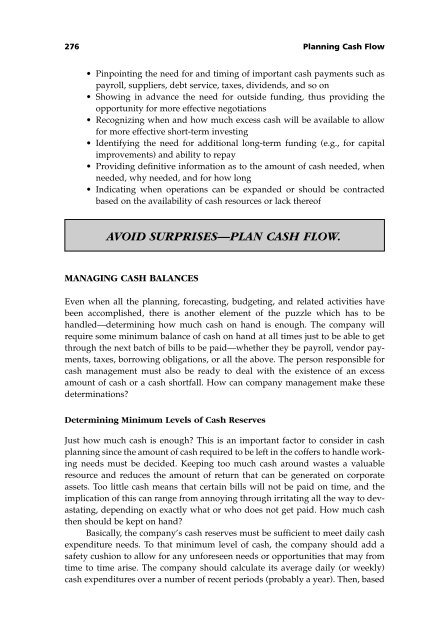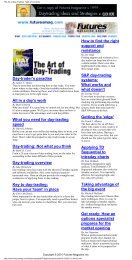- Page 2 and 3:
Managing Cash Flow An Operational F
- Page 4 and 5:
Contents About the Authors Acknowle
- Page 6 and 7:
ABOUT THE AUTHORS Rob Reider, CPA,
- Page 8 and 9:
About the Authors vii • Cash Flow
- Page 10 and 11:
INTRODUCTION CASH IS KING! Cash ava
- Page 12 and 13:
Why the Business Exists 3 • Custo
- Page 14 and 15:
Some Basic Business Principles 5
- Page 16 and 17:
Purpose of this Book 7 • Are sale
- Page 18 and 19:
CHAPTER 1 Understanding Cash Manage
- Page 20 and 21:
Understanding Cash Management 11 qu
- Page 22 and 23:
Cash Flow Basics 13 minimizing the
- Page 24 and 25:
Cash Flow Basics 15 FROM CASH TO CA
- Page 26 and 27:
Cash Flow Basics 17 • There needs
- Page 28 and 29:
Cash Flow Basics 19 The main reason
- Page 30 and 31:
History, the Fed, and Float 21 HIST
- Page 32 and 33:
History, the Fed, and Float 23 •
- Page 34 and 35:
History, the Fed, and Float 25 vers
- Page 36 and 37:
History, the Fed, and Float 27 Rece
- Page 38 and 39:
Bank Issues and Concerns 29 • Che
- Page 40 and 41:
Bank Issues and Concerns 31 or neve
- Page 42 and 43:
Conclusion 33 affects its relations
- Page 44 and 45:
CHAPTER 2 Managing Cash Flow—Rece
- Page 46 and 47:
Using the Balance Sheet 37 Change 2
- Page 48 and 49:
Cash Receipts 39 which could be use
- Page 50 and 51:
Cash Receipts 41 Sales per Day Avg.
- Page 52 and 53:
Cash Receipts 43 happening—would
- Page 54 and 55:
Cash Receipts 45 Invoicing The star
- Page 56 and 57:
Cash Receipts 47 earmark those for
- Page 58 and 59:
Cash Receipts 49 We can adjust the
- Page 60 and 61:
Cash Receipts 51 Finance Charges CA
- Page 62 and 63:
Cash Receipts 53 Standard sized env
- Page 64 and 65:
Cash Receipts 55 PAC Issuing Instit
- Page 66 and 67:
Cash Receipts 57 duction of about $
- Page 68 and 69:
Cash Disbursements 59 Sequence of A
- Page 70 and 71:
Cash Disbursements 61 determine whe
- Page 72 and 73:
Cash Disbursements 63 this system t
- Page 74 and 75:
Cash Disbursements 65 Estimated Fun
- Page 76 and 77:
Conclusion 67 Local Office #1 Sales
- Page 78 and 79:
CHAPTER 3 Planning and Budgeting PL
- Page 80 and 81:
Relationship Between Planning and B
- Page 82 and 83:
Relationship Between Planning and B
- Page 84 and 85:
Strategies for Competitive Advantag
- Page 86 and 87:
Strategic Planning Process 77 EXTER
- Page 88 and 89:
Strategic Planning Process 79 Once
- Page 90 and 91:
Short-Term Planning 81 D. PLANNING
- Page 92 and 93:
Short-Term Planning 83 TOP MANAGEME
- Page 94 and 95:
Short-Term Planning 85 Segment miss
- Page 96 and 97:
Short-Term Planning 87 Planning mis
- Page 98 and 99:
Short-Term Planning 89 limited in n
- Page 100 and 101:
Short-Term Planning 91 achievements
- Page 102 and 103:
Short-Term Planning 93 Credit/Colle
- Page 104 and 105:
CHAPTER 4 Analyzing the Sales Funct
- Page 106 and 107:
Purpose of the Sales Function 97 a
- Page 108 and 109:
Purpose of the Sales Function 99 1.
- Page 110 and 111:
Purpose of the Sales Function 101 L
- Page 112 and 113:
Purpose of the Sales Function 103 b
- Page 114 and 115:
Purpose of the Sales Function 105
- Page 116 and 117:
Purpose of the Sales Function 107 b
- Page 118 and 119:
Purpose of the Sales Function 109
- Page 120 and 121:
Purpose of the Sales Function 111 S
- Page 122 and 123:
Purpose of the Sales Function 113 1
- Page 124 and 125:
Purpose of the Sales Function 115 t
- Page 126 and 127:
Purpose of the Sales Function 117 1
- Page 128 and 129:
Purpose of the Sales Function 119 r
- Page 130 and 131:
Purpose of the Sales Function 121
- Page 132 and 133:
CHAPTER 5 Cost Reduction Analysis P
- Page 134 and 135:
Benchmarking Strategies 125 BENCHMA
- Page 136 and 137:
Benchmarking Strategies 127 determi
- Page 138 and 139:
Benchmarking Strategies 129 The ben
- Page 140 and 141:
Benchmarking Strategies 131 Product
- Page 142 and 143:
Benchmarking Strategies 133 Sales F
- Page 144 and 145:
Benchmarking Strategies 135 so that
- Page 146 and 147:
Benchmarking Strategies 137 To this
- Page 148 and 149:
Benchmarking Strategies 139 • Wha
- Page 150 and 151:
Benchmarking Strategies 141 increas
- Page 152 and 153:
Benchmarking Strategies 143 no ince
- Page 154 and 155:
Benchmarking Strategies 145 to eval
- Page 156 and 157:
Benchmarking Strategies 147 Accordi
- Page 158 and 159:
Benchmarking Strategies 149 Number
- Page 160 and 161:
Benchmarking Strategies 151 • Pur
- Page 162 and 163:
Activity Based Costing Principles 1
- Page 164 and 165:
Activity Based Costing Principles 1
- Page 166 and 167:
Activity Based Costing Principles 1
- Page 168 and 169:
Activity Based Costing Principles 1
- Page 170 and 171:
Activity Based Costing Principles 1
- Page 172 and 173:
Activity Based Costing Principles 1
- Page 174 and 175:
Activity Based Costing Principles 1
- Page 176 and 177:
Activity Based Costing Principles 1
- Page 178 and 179:
Activity Based Costing Principles 1
- Page 180 and 181:
Activity Based Costing Principles 1
- Page 182 and 183:
Activity Based Costing Principles 1
- Page 184 and 185:
Conclusion 175 the costs to particu
- Page 186 and 187:
Looking at the Accounting Function
- Page 188 and 189:
Choosing What to Analyze 179 expert
- Page 190 and 191:
Choosing What to Analyze 181 1. Def
- Page 192 and 193:
Identifying Goals and Basic Busines
- Page 194 and 195:
Financial Reporting 185 2. Accounts
- Page 196 and 197:
Financial Reporting 187 ASSETS Cash
- Page 198 and 199:
Compiling the Data 189 1. Organizat
- Page 200 and 201:
Compiling the Data 191 h. What is y
- Page 202 and 203:
Analyzing the Data 193 1. Organizat
- Page 204 and 205:
Analyzing the Data 195 e. Do you au
- Page 206 and 207:
Analyzing the Data 197 c. Can you p
- Page 208 and 209:
Organizational Issues 199 Controlle
- Page 210 and 211:
Budget Analysis 201 Budget Actual C
- Page 212 and 213:
Analysis of Functional Costs 203
- Page 214 and 215:
Analysis of Functional Costs 205 La
- Page 216 and 217:
Analysis of Accounting Operations 2
- Page 218 and 219:
Analysis of Accounting Operations 2
- Page 220 and 221:
Activity-Based Costing Applications
- Page 222 and 223:
Developing Recommendations 213 •
- Page 224 and 225:
Specific Recommendations 215 7. Per
- Page 226 and 227:
Specific Recommendations 217 ager a
- Page 228 and 229:
Specific Recommendations 219 figure
- Page 230 and 231:
Specific Recommendations 221 • Gr
- Page 232 and 233:
Specific Recommendations 223 • Sa
- Page 234 and 235: Specific Recommendations 225 Curren
- Page 236 and 237: Specific Recommendations 227 Curren
- Page 238 and 239: Specific Recommendations 229 Based
- Page 240 and 241: Specific Recommendations 231 Curren
- Page 242 and 243: Organization Recommendations 233
- Page 244 and 245: Other Areas for Review 235 • The
- Page 246 and 247: Conclusion 237 must change its beli
- Page 248 and 249: CHAPTER 7 Investing, Financing, and
- Page 250 and 251: Investing Excess Cash 241 puts upwa
- Page 252 and 253: Investing Excess Cash 243 Instrumen
- Page 254 and 255: Investing Excess Cash 245 • Depre
- Page 256 and 257: Investing Excess Cash 247 Cash Outf
- Page 258 and 259: Investing Excess Cash 249 Investmen
- Page 260 and 261: Borrowing for Cash Shortfalls 251 t
- Page 262 and 263: Borrowing for Cash Shortfalls 253 m
- Page 264 and 265: Borrowing for Cash Shortfalls 255 t
- Page 266 and 267: Borrowing for Cash Shortfalls 257 r
- Page 268 and 269: Borrowing for Cash Shortfalls 259 I
- Page 270 and 271: Borrowing for Cash Shortfalls 261 A
- Page 272 and 273: CHAPTER 8 Planning Cash Flow MANAGI
- Page 274 and 275: Cash Flow Planning 265 or more futu
- Page 276 and 277: Cash Flow Planning 267 Cash Budgeti
- Page 278 and 279: Cash Flow Planning 269 ACTUAL PROJE
- Page 280 and 281: Cash Flow Planning 271 ACTUAL PROJE
- Page 282 and 283: Cash Flow Planning 273 ACTUAL PROJE
- Page 286 and 287: Managing Cash Balances 277 on its u
- Page 288 and 289: Cash Planning Approaches 279 Dealin
- Page 290 and 291: Cash Planning Approaches 281 Cash f
- Page 292 and 293: Conclusion 283 Cash flows from oper
- Page 294 and 295: CHAPTER 9 Controlling and Analyzing
- Page 296 and 297: Cash Flow Projections: Methodology
- Page 298 and 299: Cash Flow Projections: Methodology
- Page 300 and 301: Cash Flow Projections: Methodology
- Page 302 and 303: Cash Flow Reporting and Controls 29
- Page 304 and 305: Cash Flow Reporting and Controls 29
- Page 306 and 307: Cash Flow Reporting and Controls 29
- Page 308 and 309: Cash Flow Reporting and Controls 29
- Page 310 and 311: Interpretation and Analysis of Cash
- Page 312 and 313: Interpretation and Analysis of Cash
- Page 314 and 315: Interpretation and Analysis of Cash
- Page 316 and 317: Interpretation and Analysis of Cash
- Page 318 and 319: Interpretation and Analysis of Cash
- Page 320 and 321: Interpretation and Analysis of Cash
- Page 322 and 323: Interpretation and Analysis of Cash
- Page 324 and 325: Interpretation and Analysis of Cash
- Page 326 and 327: Interpretation and Analysis of Cash
- Page 328 and 329: Interpretation and Analysis of Cash
- Page 330 and 331: Cash Flow Reporting and Controls 32
- Page 332 and 333: AFTERWORD The materials in this boo
- Page 334 and 335:
APPENDIX A Case Study: Managing Cas
- Page 336 and 337:
Jack B. Nimble Company 327 ($$ in 0
- Page 338 and 339:
Jack B. Nimble Company 329 ABC Mach
- Page 340 and 341:
Jan Feb Mar Apr May Jun Jul Aug Sep
- Page 342 and 343:
Cash Forecast Information 333 him,
- Page 344 and 345:
Jan Feb Mar Apr May Jun Jul Aug Sep
- Page 346 and 347:
Jack B. Nimble Company Suggested So
- Page 348 and 349:
Jack B. Nimble Company Suggested So
- Page 350 and 351:
APPENDIX B Cash Conservation Checkl
- Page 352 and 353:
Liabilities and Equity 343 ASSETS Y
- Page 354 and 355:
Income and Expenses 345 INCOME AND
- Page 356 and 357:
Index A ABC, see Activity based cos
- Page 358 and 359:
Index 349 traditional, 159-161 unit
- Page 360 and 361:
Index 351 P Payables, 16, 59 Paymen




